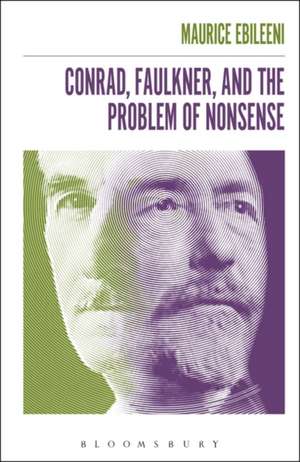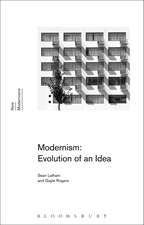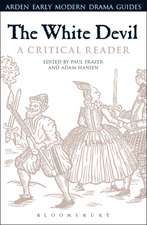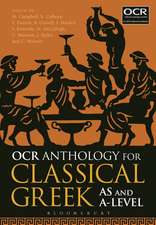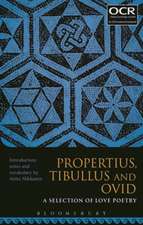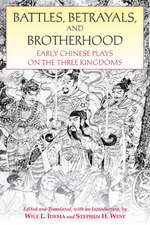Conrad, Faulkner, and the Problem of NonSense
Autor Dr. Maurice Ebileenien Limba Engleză Paperback – 22 mar 2017
| Toate formatele și edițiile | Preț | Express |
|---|---|---|
| Paperback (1) | 254.28 lei 6-8 săpt. | +88.31 lei 7-13 zile |
| Bloomsbury Publishing – 22 mar 2017 | 254.28 lei 6-8 săpt. | +88.31 lei 7-13 zile |
| Hardback (1) | 653.77 lei 6-8 săpt. | |
| Bloomsbury Publishing – 23 sep 2015 | 653.77 lei 6-8 săpt. |
Preț: 254.28 lei
Preț vechi: 329.49 lei
-23% Nou
Puncte Express: 381
Preț estimativ în valută:
48.66€ • 50.80$ • 40.27£
48.66€ • 50.80$ • 40.27£
Carte tipărită la comandă
Livrare economică 05-19 aprilie
Livrare express 01-07 martie pentru 98.30 lei
Preluare comenzi: 021 569.72.76
Specificații
ISBN-13: 9781501330742
ISBN-10: 1501330748
Pagini: 176
Dimensiuni: 140 x 216 x 15 mm
Greutate: 0.2 kg
Ediția:NIPPOD
Editura: Bloomsbury Publishing
Colecția Bloomsbury Academic
Locul publicării:New York, United States
ISBN-10: 1501330748
Pagini: 176
Dimensiuni: 140 x 216 x 15 mm
Greutate: 0.2 kg
Ediția:NIPPOD
Editura: Bloomsbury Publishing
Colecția Bloomsbury Academic
Locul publicării:New York, United States
Caracteristici
In exploring psychoanalytic theory, it offers readings of Jacques Lacan's final phase: a period that has been less accessible than others in Lacan's career and therefore less written about
Notă biografică
Maurice Ebileeni is Lecturer in the English Department at the University of Haifa, Israel.
Cuprins
AcknowledgementsList of Abbreviations Introduction The Problem of Nonsense Chapter One: The Question of Authority Conrad's Cynicism Beyond Cynicism The Institution of Nonsense Chapter Two: An Alternative Perspective on the Aims of Narration The Real Conrad's Neurosis in Narration Textual Psychosis in Faulkner's Novels A Psychoanalytical Diagnosis of Nonsense Chapter Three: Conrad's Symptom Lord Jim Heart of Darkness Under Western Eyes Chapter Four: Faulkner's Sinthome The Sound and the Fury As I Lay Dying ConclusionNotes Works Cited Index
Recenzii
In much the same way as the dark edge of its shadow defines the subject of a painting, Ebileeni's exceptionally well-researched and documented psychoanalytic study concerning the authorial choices of Conrad and Faulkner foregrounds their understanding of the concept of nonsense and identifies it as a major structural component in their mastery of the complexity of their art.
Conrad, Faulkner, and the Problem of NonSense is a novel contribution to the field of literary studies, which so far has not really taken to a Lacanian approach. Introducing a new approach with clarity, the book offers its readers an original methodology to tackle a literary text that is most welcome today. What is remarkable is that Ebileeni makes his points with clarity and simplicity, while at the same time refusing to give up on a firm methodology based on state-of-the-art theoretical considerations.
In Conrad, Faulkner, and the Problem of NonSense, Maurice Ebileeni has written a sophisticated and original analysis of the ineffable, of what language is incapable of expressing directly, in several important works by Joseph Conrad and William Faulkner. Conrad was Faulkner's great mentor, and Ebileeni explores the surprising parallels among their themes and techniques. The theoretical foundations of the book - primarily Lacanian - are introduced with unusual clarity. Full of original insights for readers of Conrad and Faulkner, Conrad, Faulkner, and the Problem of NonSense is an intellectual treat, an appealing debut for an important young scholar.
This insightful book is the strongest Lacanian account we have of the connection between two of the most consequential world novelists of the past century. In a series of sensitive readings of Conrad's and Faulkner's major novels, Ebeleeni tells the story of the invention of 'nonsense'-the excess of reality and experience over contemporary capacities of convention and expression-as a modern art form, and the epic struggles of Conrad to 'endure' and Faulkner to 'prevail' over the implications of a world whose greatest concerns may lie in those realms beyond conventionalized 'sense.' An important and stimulating contribution.
Ebileeni's study is a welcome contribution to the critical corpus. Owing to its methodological patience and clarity of conceptualization, the book provides an introduction to Lacanian concepts in a language that is free of jargon and performativity. This is an informed and original work that, by staging a return to some of the commonplaces of Conrad and Faulkner criticism through a Lacanian interpretative frame, reconfigures and defamiliarizes the way we read their major works.
Conrad, Faulkner, and the Problem of NonSense is a novel contribution to the field of literary studies, which so far has not really taken to a Lacanian approach. Introducing a new approach with clarity, the book offers its readers an original methodology to tackle a literary text that is most welcome today. What is remarkable is that Ebileeni makes his points with clarity and simplicity, while at the same time refusing to give up on a firm methodology based on state-of-the-art theoretical considerations.
In Conrad, Faulkner, and the Problem of NonSense, Maurice Ebileeni has written a sophisticated and original analysis of the ineffable, of what language is incapable of expressing directly, in several important works by Joseph Conrad and William Faulkner. Conrad was Faulkner's great mentor, and Ebileeni explores the surprising parallels among their themes and techniques. The theoretical foundations of the book - primarily Lacanian - are introduced with unusual clarity. Full of original insights for readers of Conrad and Faulkner, Conrad, Faulkner, and the Problem of NonSense is an intellectual treat, an appealing debut for an important young scholar.
This insightful book is the strongest Lacanian account we have of the connection between two of the most consequential world novelists of the past century. In a series of sensitive readings of Conrad's and Faulkner's major novels, Ebeleeni tells the story of the invention of 'nonsense'-the excess of reality and experience over contemporary capacities of convention and expression-as a modern art form, and the epic struggles of Conrad to 'endure' and Faulkner to 'prevail' over the implications of a world whose greatest concerns may lie in those realms beyond conventionalized 'sense.' An important and stimulating contribution.
Ebileeni's study is a welcome contribution to the critical corpus. Owing to its methodological patience and clarity of conceptualization, the book provides an introduction to Lacanian concepts in a language that is free of jargon and performativity. This is an informed and original work that, by staging a return to some of the commonplaces of Conrad and Faulkner criticism through a Lacanian interpretative frame, reconfigures and defamiliarizes the way we read their major works.
